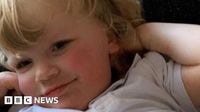The tragic death of five-year-old Theo Treharne-Jones during a family holiday in Greece has left a community in Wales searching for answers and a family grappling with unimaginable loss. As the inquest into the circumstances of his drowning at the Atlantica Holiday Village in Kos continues, new details have emerged, painting a picture of a lively, loving child whose vulnerabilities may have played a role in the heartbreaking events of June 15, 2019.
Theo, from Merthyr Tydfil, was described by his mother, Nina Treharne, as an "excitable, happy, loving little child" with "no sense of danger." According to BBC News, Theo had been diagnosed with Smith-Magenis syndrome, a rare neurodevelopmental disorder that affected his sleep, left him non-verbal, and led to "autistic behaviours" that may have made him less naturally cautious. His mother told the Pontypridd Coroner's Court that these characteristics made it essential for the family to take extra precautions during holidays.
The family had stayed at the same hotel nine months prior, but this time, the apartment they were assigned lacked a chain lock on the door—a feature present in their previous accommodation. Ms. Treharne recounted, "The door had no chain lock in this room," adding that she had placed her two sons' buggy and a suitcase against the door "as a precaution." She told the court, "I said to Richard there's no chain on this door, you can't lock it, you couldn't lock it from the inside. We had the prams and our cases, so I just put them in front of the door."
On the night before the tragedy, the family retired after dinner, unaware that the next morning would bring disaster. Ms. Treharne described the harrowing moment she awoke: "There was banging and someone was shouting: 'There's a child in the pool, there's a child in the pool.' It was like waking up to a nightmare." When she realized Theo was not in the room and the door was ajar, panic set in. Another holidaymaker, Owen Sampson, had seen Theo pushing his buggy alone near the pool but, seeing a woman nearby, assumed she was his mother and did not intervene. "I was like, where's your mum and dad? When I got down to the bottom of the pool, I saw a lady in a yellow bikini doing her hair and I just assumed that was his mum. So I walked straight past and carried on," Sampson explained at the inquest, as reported by Daily Mail.
Moments later, another guest spotted Theo face down in the shallow end of the pool and pulled him out. Stuart Zammitto-Nicholl, who found the boy, said in a statement, "I was doing CPR for five minutes but it felt like forever." Fellow guest Tracey Wheedon also performed CPR while others frantically searched for a defibrillator. Adam Holmes, a first aid trainer staying at the hotel, advised on resuscitation efforts and performed chest compressions. Holmes expressed concern about the delay in finding the defibrillator, which was eventually located at a nearby doctor's surgery. "It wouldn't seem so, no," Holmes replied when asked if anyone else would have fetched the device had he not done so. Despite three cycles with the defibrillator, no shock was delivered.
When the ambulance crew arrived—without a stretcher—Theo's father, Richard Jones, had to carry his son to the vehicle. Holmes accompanied them to the hospital, continuing chest compressions while Mr. Jones used a bag valve and mask to push oxygen into Theo's lungs. According to witness accounts cited by BBC News, Theo was last seen at 08:40, got into difficulty in the pool at around 08:41, and emergency services were called at 08:51. Dr. Patrick Morgan, a consultant in anaesthetic and pre-hospital care, testified that Theo was likely in the water for "two to five minutes" before resuscitation began. He stated that due to the lack of oxygen and time submerged, "it would have made no difference to the outcome whether the defibrillator was there or not." Dr. Morgan added that the initial submersion was likely "enough to prove fatal." However, he noted that had a two-person ambulance crew with high-level training and the right equipment arrived immediately, Theo "might have survived."
The hotel pools were only staffed by lifeguards between 10:00 and 18:00, but the incident occurred before lifeguards were on duty. This gap in supervision has raised questions about the adequacy of safety measures at the resort. The day before Theo's death, a safety audit was conducted at the hotel, highlighting two minor issues: the lack of clear markings on pool steps and a ladder. Libby Jones, General Manager for Overseas Health and Safety at TUI, explained to the inquest that neither issue was deemed "critical" or a risk to life. She also discussed the company's approach to door security, referencing the "blue book"—the Association of British Travel Agents (ABTA) Tourism Accommodation Health & Safety Technical Guide. While the guide suggests that a security chain or latch "could be provided," TUI had considered and rejected the idea of installing chains on all hotel doors, citing a "too great of a fire risk."
The clinical cause of death was given as drowning. The inquest, ongoing as of October 14, 2025, is examining not only the events that led to Theo's tragic death but also the broader issues of hotel safety, staff preparedness, and the challenges faced by families traveling with children who have special needs. The family, supported by the community in Merthyr Tydfil, is left to mourn a beloved child whose vulnerabilities made him especially at risk in an environment that, in hindsight, proved insufficiently secure.
As the inquest resumes, it will continue to probe whether more could have been done to prevent such a tragedy and what lessons can be drawn for the future. For now, the memory of Theo Treharne-Jones—an "excitable, happy, loving little child"—serves as a stark reminder of the importance of vigilance, clear safety standards, and compassion in the face of loss.






